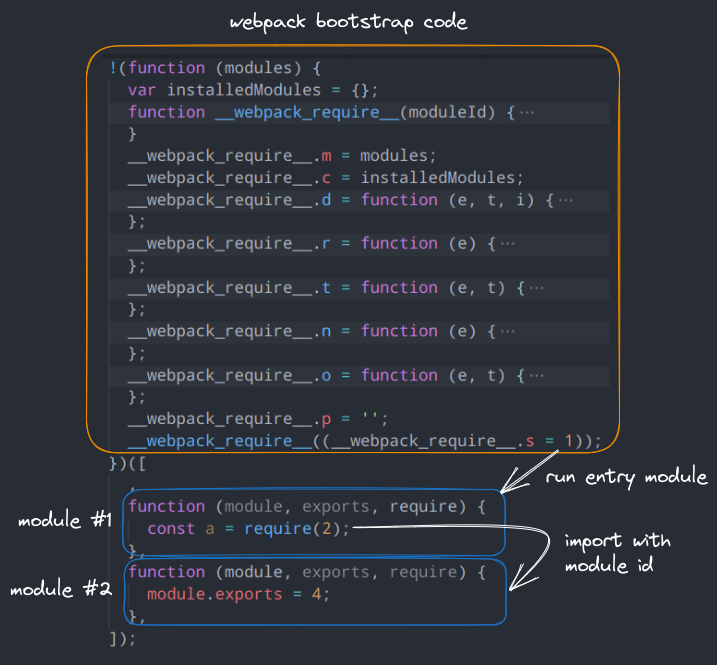Bundle Unpacking
This feature can unpack webpack and browserify bundles into separate files.
Webpack
__webpack_require(id)__gets rewritten torequire('./relative/path.js').Modules may get converted to ESM.
multiple chunks are not supported yet.

__webpack_require__
/**
* Most of the time this is an object for multiple exports,
* but a module can export anything
*/
type Exports = unknown;
/**
* Each module is wrapped in a factory function to give it access to these arguments like they were global variables
*/
type FactoryFunction = (
module: Module,
exports: Exports,
__webpack_require__: WebpackRequire,
) => void;
interface Module {
exports: Exports; // module exports
i: number; // module id
l: boolean; // loaded
}__webpack_require__ is a function with some additional properties:
interface WebpackRequire {
// Call to load a module
(moduleId: number): Exports;
// Define getter functions for esm exports
d(exports: Exports, name: string, getter: () => Exports): void;
// Load a chunk
e(chunkId: number): Promise<Exports>;
// Returns globalThis or window
g(): typeof globalThis;
// loadScript function to load a script via script tag
l(
url: string,
done: (event: Event) => void,
key: string | undefined,
chunkId: number,
): void;
// Get the default export of a module, for compatibility with non-esm
n(exports: Exports): { (): Exports; get a(): Exports };
// Object.prototype.hasOwnProperty.call
o(object: unknown, property: string): boolean;
// On error function for async loading
oe(err: Error): never;
// Set __esModule to true
r(exports: Exports): void;
// Create a fake namespace object
t(value: number | Record<string, unknown>, mode: number): unknown;
// Get javascript chunk filename. Example: u(0) -> 'chunks/0.138aa346.js'
u(chunkId: number): string;
// Contains all installed modules. The keys are module ids
c: Record<number, Module>;
f: {
// JSONP chunk loading for javascript
j(chunkId: number, promises: Promise<unknown>[]): void;
};
// Contains all module functions. The keys are module ids
m: Record<number, FactoryFunction>;
// Public base path for chunks. Example: '/_next/'
p: string;
// Entry module id
s: number;
// All WebAssembly.instance exports. The keys are wasm module ids
w: Record<number, Exports>;
}Browserify
Each module has a numerical id and contains a list of dependencies: { './foo': 1, './bar': 3 }. These paths are relative to the current module and are used like require('./foo').
The absolute path a module is not stored anywhere, so webcrack builds a dependency tree and resolves the paths to preserve the original file structure as much as possible.
Example
Module id -> dependencies:
{
0: { 1: './a.js', 4: 'lib' }, // entry
1: { 2: '../bar/b.js' },
2: { 3: '../../c.js' },
3: {},
4: {},
}Resulting file structure:
├── tmp0
│ ├── tmp1
│ │ ├── index.js
│ │ └── a.js
│ └── bar
│ └── b.js
├── c.jsSometimes the entry module was deeply nested (e.g. src/app/index.js), but "src" or "app" is not included in the bundle. In this case, directory names like tmp0/tmp1, etc. are used instead.
 webcrack
webcrack